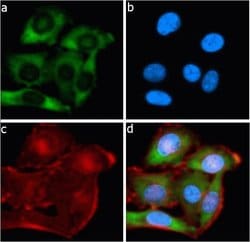Learn More
Bcl-2 Recombinant Polyclonal Antibody (8HCLC), Invitrogen™
Rabbit Recombinant Polyclonal Antibody
Supplier: Thermo Scientific 710515
Description
This antibody is predicted to react with bovine, canine, equine, feline, non-human primate, mouse, rat and porcine based on sequence homology. Recombinant rabbit polyclonal antibodies are unique offerings from Thermo Fisher Scientific. They are comprised of a selection of multiple different recombinant monoclonal antibodies, providing the best of both worlds - the sensitivity of polyclonal antibodies with the specificity of monoclonal antibodies - all delivered with the consistency only found in a recombinant antibody. While functionally the same as a polyclonal antibody - recognizing multiple epitope sites on the target and producing higher detection sensitivity for low abundance targets - a recombinant rabbit polyclonal antibody has a known mixture of light and heavy chains. The exact population can be produced in every lot, circumventing the biological variability typically associated with polyclonal antibody production.
BCL-2 is a key regulator of apoptosis that functions to either inhibit or promote cell death. The BCL-2 family members are also characterized by dimerizing to further modulate apoptosis. Bag1, for example, has been found to form a heterodimer with BCL-2 resulting in the enhancement of the anti-apoptotic effect of BCL-2. Bax and Bak have been shown to play a critical role in cytochrome c release from mitochondria and thus initiate apoptosis. Bax exerts a pro-apoptotic rather than an anti-apoptotic effect on cells. Constitutive expression of BCL2, such as in the case of translocation of BCL2 to Ig heavy chain locus, is thought to be the cause of follicular lymphoma. In most follicular lymphomas, neoplastic germinal centers express high levels of BCL-2 alpha protein, whereas the normal or hyperplastic germinal centers are negative. Two transcript variants of BCL-2, produced by alternate splicing, differ in their C-terminal ends. The overexpression of BCL-2 has been linked to human cancers such as B-cell lymphoma and prostate cancer.
Specifications
| Bcl-2 | |
| Recombinant Polyclonal | |
| 0.5 mg/mL | |
| PBS with 0.09% sodium azide | |
| P10415 | |
| Bcl2 | |
| Peptide corresponding to amino acids 51-64 of human BCL-2 | |
| 100 μg | |
| Primary | |
| Human | |
| Antibody | |
| IgG |
| Immunocytochemistry | |
| 8HCLC | |
| Unconjugated | |
| Bcl2 | |
| apoptosis regulator Bcl-2; AW986256; B cell leukemia/lymphoma 2; B cell lymphoma 2 associated oncogene; B-cell CLL/lymphoma 2; B-cell leukemia/lymphoma 2; Bcl 2; BCL2; bcl-2; BCL2 apoptosis regulator; Bcl-2 protein; BCL2, apoptosis regulator; Bcl2-like protein; C430015F12Rik; D630044D05Rik; D830018M01Rik; OTTHUMP00000163680; PPP1R50; protein phosphatase 1, regulatory subunit 50 | |
| Rabbit | |
| Protein A | |
| RUO | |
| 596 | |
| Store at 4°C short term. For long term storage, store at -20°C, avoiding freeze/thaw cycles. | |
| Liquid |
Your input is important to us. Please complete this form to provide feedback related to the content on this product.
